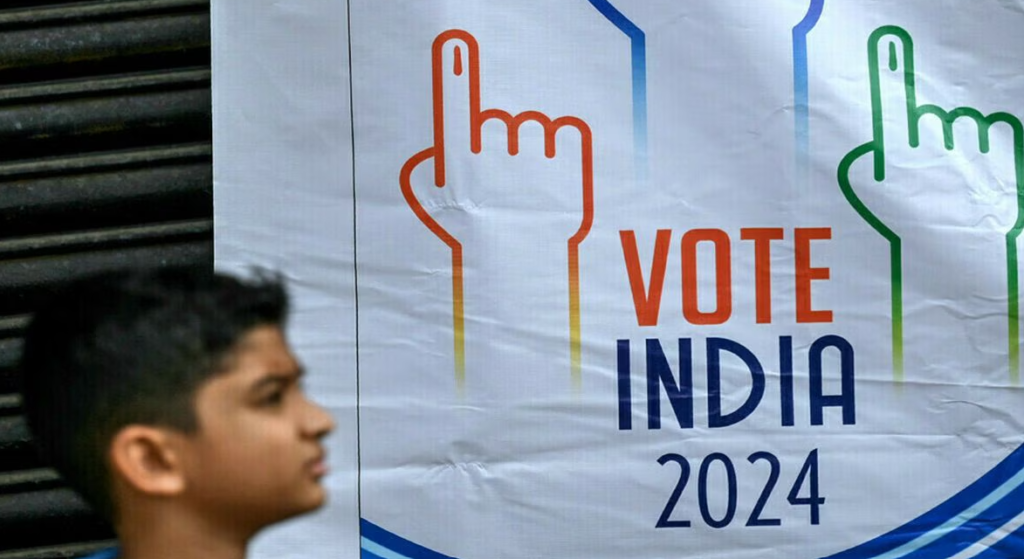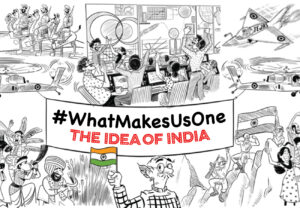❈ ❈ ❈
Who Does June 4 Belong to?
Rohit Kumar
This is the collective win of millions.
June 4 will go down as the day democracy came back from the dead in India, the day the almighty Bharatiya Janta Party failed to get even a simple majority in what former Election Commissioner Ashok Lavasa has called the “hottest and most hateful” Lok Sabha elections, ever.
Most of all, it will be remembered as the day the power of Narendra Modi was broken.
The politician who, over the years had earned epithets such as “He Who Must Not Be Named”, “He For Whom There is No Alternative” and less flatteringly, “Divider-In-Chief”, has been defeated for the first time in his political life. He wasn’t a god and non-biological, after all.
The world looks sane again.
The day belongs to the Opposition. Of that, there is no doubt. It belongs to Rahul Gandhi who walked across the country despite a damaged knee and created a new kind of samvaad with the people of India. It also belongs to Akhilesh Yadav and Tejashwi Yadav, who, though he did not perform quite as well as he would have liked, possibly broke all campaigning records. It belongs to every karyakarta and leader of every political party who did not capitulate in the face of an ED raid or the threat of arrest. It belongs to Hemant Soren and Kalpana Soren.
Even more, it belongs to the unseen millions who fought the poisonous hate of the RSS and its divisive Hindutva day in and day out.
It belongs to Umar Khalid who has been in jail for the last three years for promoting unity and non-violence, and to his brave partner, Banojyotsna, whose wry sense of humour and raw courage has sustained her. (Release Umar already!)
It belongs to Father Stan Swamy who lived his life for the tribals of India and who was denied even a sipper during his last hellish days in Taloja Jail.
The day belongs to Sudha Bhardwaj, Gautam Navlakha, Rona Wilson, G.N. Saibaba and everyone who was arrested in the farcical Elgar Parishad case.
June 4 belongs, in very large part, to farmers like Sukhdarshan Natt and his wife, Jasbir Kaur, who spent a year camped on the road at Delhi’s Tikri border with lakhs of other farmers protesting against Modi’s three draconian farm laws. When I told them on one of my many sojourns to the Tikri border that I was grieving the death of my mother who had passed away just a few months ago, Jasbir ji told me, “Anytime you miss her too much, come and stay with us. We are your family, too.”
June 4 belongs to the more than seven hundred farmers who died protesting Modi’s dictatorship. It belongs to that old farmer who was mowed down by Ajay Misra Teni’s son in Lakhimpur in that horrific phone video.
June 4 belongs to Pooja, the political science teacher, who quietly continued to teach her students the chapters on democracy and the freedom movement long after the government had ordered them removed from the syllabus.
The day belongs to those aging but ageless men and women who walked the roads, day in and day out, jholaas slung over their shoulders – like Roop Rekha Verma and others – distributing pamphlets on love, peace, harmony and democracy. They could have, in the autumn of their lives, sat comfortably in the confines of their homes and played with their grandchildren but they cared enough about others’ grandkids to go out on the streets and talk about the future of democracy.
Then there is Engineer Rashid and the political prisoners of Jammu and Kashmir.
This day belongs to my friend Novita, the filmmaker from Punjab, who covered the 2020 farmers’ protest, stayed with the farmers, and documented their stories despite the toll it took on her health.
This day belongs to Prabir Purkayastha.
This day belongs to so many people who did what they could to bring India back from the brink. June 4 would not have been possible without them.
The day belongs to Ravish Kumar and his family. It belongs to all those thousands of journalists, YouTubers, bloggers and writers who did not give up and continued to give the news and speak the truth. It belongs to Dhruv Rathee.
Yes, the NDA still has a majority in Parliament but the Opposition won a battle against impossible odds. Never again will Narendra Modi be able to impose his malevolent will on India the way he has these past ten years.
This is the collective win of millions.
June 4 belongs to India.
(Rohit Kumar is an educator, author and independent journalist. Courtesy: The Wire, an Indian nonprofit news and opinion website. It was founded in 2015 by Siddharth Varadarajan, Sidharth Bhatia, and M. K. Venu.)
❈ ❈ ❈
A New Dawn
Sarayu Pani
It’s difficult to explain to outsiders what June 4 means to so many Indians. While it is certainly likely that Narendra Modi will form the new government, it will be a coalition. This includes partners like Chandrababu Naidu who quit the BJP-led National Democratic Alliance in 2004 (ironically for their failure to curb Modi after the 2002 Gujarat pogrom) and again in 2018 (after disagreements with Modi), and Nitish Kumar, who has developed political flip flopping into an art form. It will be Modi’s first brush with helming a meaningful coalition, without the absolute majority that has hitherto backed his ‘my way or the highway’ style of alliance management.
A parliament with no one party with a clear majority also means a return to the days of more parliamentary influence on governance, where cross coalition consensus has to be built for new legislation. Again, this is something the BJP, which has treated parliament as a rubber stamp for the last decade, will have to get used to.
And yet, beyond any of these gains, what drives sentiment today is that the idea of the inevitability of Modi has been shattered.
“Aayega to Modi hi” (“Modi is inevitable”) is a chant often used by his supporters as a cry of power. To tell his opponents that their resistance to his ideas is futile, and even dangerous. That no matter what they do or say, a Modi government is inevitable. And it is this inevitability of Modi that has directed political funding, executive actions, and to an extent, judicial decisions, in India for the last decade. It has also driven political analysis and the public discourse, where bigots have felt confident to drop their masks and openly dehumanise minorities, secure in the knowledge that Modi would forever have their backs. That has changed. “Aayega toh Modi hi” is ill-suited for limping into power propped up by a capricious Nitish and a self-interest-driven Chandrababu Naidu.
A handicapped opposition, with frozen bank accounts, threatened with judicial and executive action, and with two chief ministers in jail, fought with both hands tied behind their backs and shattered the illusion. That cannot be remade. Modi, like every other Indian politician, is now going to be treated as one of many. And to one of many politicians, the Indian electorate is a hard taskmaster.
But the impact of this election goes far beyond Modi or even Hindutva as a whole. It challenges the fundamental neoliberal assumptions that have dominated Indian political thought since liberalisation in 1991. Like a mantra, repeated blindly by believers, “reform” for the last three decades, has meant reduced regulation and increased privatisation, with little or no analysis on the actual impact of such moves. Development has meant hijacking natural resources and handing them over to favoured capitalists to be ruthlessly exploited. It has meant the bypassing of environmental regulation and mindless culling of the green cover of the country in the name of infrastructure building.
For the marginalised, inequality was assumed not to be a legitimate concern (“Should everyone be poor?” Modi disparagingly dismissed the question recently). Bare minimum poverty alleviation was all that mattered. Growth discussions were divorced from the creation of jobs, or larger planning for the transition of a large rural population out of agriculture and into other occupations.
The Congress certainly shares some of the blame for this, for it is often their own talking points from the 1990s and the 2000s that have been taken forward by the BJP to their cruel (albeit logical) extreme. For the first time in 30 years though, the Congress seems to have changed track. Under the leadership of the veteran politician, Mallikarjun Kharge, who is Dalit, backed by Rahul Gandhi’s own experiences from his Bharat Jodo Yatra, his 4,080 km on-foot trek across the length and breadth of India, the Congress seems to have finally seen the limitations of their own post liberalisation imagination of India.
Their 2024 manifesto, or “Nyay Patra” allowed the opposition, for the first time in decade, to set the discursive agenda of this election. Their highlighting of inequality and the lack of backward caste representation in the country posed questions that the BJP found impossible to counter without resorting to communal dogwhistles. Consequently, all prior talk by the BJP of development and progress was sidelined in favour of a near continuous targeting of Indian Muslims. Led by Modi himself, the party mined the depths of right wing influencer talking points to fashion their electoral campaign. From likening Muslim voting to “jihad”, to casting Muslim birth rates as demographic threats and consistently and repeatedly telling their voters that the opposition would seize their assets and give them away to Indian Muslims, all overseen by an indulgent election commission, the attempt to regain narrative control was both desperate and particularly communally vicious. And yet, it failed. In Banswara, for example, where Modi spoke of Muslims as “infiltrators” to whom the Congress would give property, the BJP lost by over 240,000 votes.
The supporters of the INDIA coalition are well aware that they have not crossed the 272 seat mark that would let them form the government, and end some of the pressing injustices enforced by the Modi government. And yet, June 4 offers a beginning. A chance for politics in the country to move away from mass religious radicalisation and violence and to return to addressing inequality and the needs of the marginalised. It must be built on, and looking at the mood of the electorate, it will be. In a country where the 1% hold 40% of the wealth, with extreme levels of youth unemployment and levels of inequality not seen since the days of colonialism, and frightening anti minority violence, it is a beginning that is very very welcome.
(Sarayu Pani is a former lawyer. Courtesy: The author’s blog on Substack, ‘Tattva’.)
❈ ❈ ❈
Results That Give Hindutva a Jolt
Anand K. Sahay
It’s clear now that the Hindutva project that Prime Minister Narendra Modi had pursued with uncommon vigour in the past ten years has been buried fathoms deep.
Technically, the outgoing government was a Bharatiya Janata Party-led National Democratic Alliance enterprise, but in reality it was a full-fledged Modi-BJP show; the NDA parties, barring sundry minor ones, had left Modi years ago. Modi ran the government as a one-man show, whimsically and brutally, looking only at big business interests and the country’s comfortable classes. The headline news is that his party has lost power. It has fallen way short of the halfway mark.
If Modi believed in democratic decorum even half way, he should have resigned and urged President Droupadi Murmu to invite the next party or pre-election coalition to take a shot at forming a stable government. Outgoing Prime Minister Rajiv Gandhi had done precisely that after the 1989 election. His party had won close to 200 seats in the House but he felt he had lost power since his Congress party did not have half the seats in the Lok Sabha. He could have easily formed a coalition government, but declined to do so, rejecting all pressures.
But Modi is a very different political animal. He has roped in lapsed NDA partners like N. Chandrababu Naidu’s Telugu Desam Party and Nitish Kumar’s Janata Dal (United), seeking accommodation at the local level in their respective states, and with the help of this last minute-NDA, he plans to return to the seat of office as prime minister. Together these NDA parties clear the halfway mark.
Modi has waved away constitutional ethics and political morality. He organised himself a victory oration at the BJP national headquarters when the counting was still on, thumping himself on the back for his third ‘win’ on the trot. For all the contrived enthusiasm, it was a lacklustre event. This was written on everyone’s face, including Modi’s. But the ashen visage of defence minister Rajnath Singh, seated next to Modi, said it all.
It looked as though the Rajput from UP, among the more honourable ones to win his (Lucknow) seat, was kicked in the stomach but just held on for dear life and agreed to take the stage. The outgoing home minister, Amit Shah, flanked Modi on the other side but appeared decidedly subdued. Modi’s other erstwhile cabinet colleagues were either not invited or stayed away. Party president J.P. Nadda, who is clearly Modi’s own marionette, made a falsely rousing speech but no one looked interested.
It was evident that a defeated Modi-BJP was trying to put up a giant-sized pretence.
The trouble with the whole thing is that Modi’s NDA allies, especially Naidu and Nitish, have been contacted by leading figures on the INDIA grouping which, in number terms, is snapping at Modi-BJP’s heels. If these parties switch for their own political reasons in the event that they negotiate with INDIA and get a deal that interests them, the INDIA alliance would be ahead of the NDA.
It does seem that Modi, like Trump in US before him, is finding it hard to accept that he has fallen from the perch. More, he is trying to brazen it out although he knows that he scraped through his own seat in Varanasi by a margin much smaller than before and that Uttar Pradesh, the land of the Ayodhya temple, until recently thought to be Modi’s ready-made tramping ground, now represents a wasteland for Modi-BJP. On leads, the INDIA grouping is ahead of Modi’s party.
It is hard to get away from the feeling that the entire charade of celebrating Modi’s victory was conducted to bring pressure on Rashtrapati Bhavan to do Modi’s bidding and invite him to be sworn in as prime minister even before the results were officially declared. There can be little doubt that the supposed celebration is simultaneously a tactic to pressure and threaten other senior BJP leaders – as well as the RSS headquarters in Nagpur – not to challenge or even obliquely seek to question Modi’s leadership credentials.
(Anand K. Sahay is a journalist and political commentator based in New Delhi. Courtesy: The Wire.)
❈ ❈ ❈
Voters Force Narendra Modi to Become a Labharthi of his Allies
Ashutosh Bhardwaj
A google search of “PM ne di Saugat” produces a staggering 81 million pages in less than a second. It lists news items about the schemes and programmes the Varanasi MP launched, announced or promised as prime minister. Even the inauguration of a 52-km road in a small town of northern Chhattisgarh or the unveiling of a statue in Assam was headlined as “PM ki saugat”.
The Persian word saugat denotes a gift, especially brought from a far-off land. The projection of essential official duties as “saugat” by the media was in furtherance of his diligent agenda to reduce the citizens into labharthis, a class of people who are unable to avail of the rights they have as citizens and have been repeatedly told they are only alive as they live off the crumbs offered by the benevolent emperor.
At one level, the Modi government directly suppressed the civil liberties by targeting academics, journalists and writers, on the other it sought to inject a feeling within citizens that it’s not their constitutional right to have a road in their village or food on their plate, it can arrive only via charity offered by a divine and non-biological king.
His election victories were consistently attributed to the labharthi, a beneficiary who must bow before him with humility and servitude. The agitprop pushed the state-citizen relationship several centuriesbehind, into a time when all rights were at the mercy of the king.
Not that the United Progressive Alliance (UPA) government didn’t have its failures, but those ten years were marked by legislations that focused on citizens’ rights, and a vibrant discourse about rights and their implementations was the order of the day. In contrast, Modi incessantly underlined citizen’s duties, with his brigade targeting and undermining those who demanded their rights.
The Lok Sabha results mark the assertion of the citizen against the pernicious agenda to diminish her into a labharthi. Modi’s penetration into rural India is often attributed to his electoral gains in the last decade. The ‘saugat’ that the visitor king offered to the needy took the predominantly urban-centric party to the hinterland. In 2019, his party won 236 of 398 rural seats. He lost 71 of them in 2024, the near-exact number of total seats he lost this year. The biggest drop of 2.2% in the vote share of his alliance has come from rural India. If the proposition of labharthi had worked before in rural India, it stood rejected this time.
Another devilish propaganda that stood exposed was of the Muslim vote. The Modi machinery is still attributing his defeat to ‘Muslim consolidation’. But these are Hindus who have rejected him. Uttar Pradesh, that knocked him out of the contest has 79.7% Hindus as against 19.3% Muslims. Haryana where he lost five seats has only 7% Muslims, Rajasthan that saw him losing as many as ten seats has a mere 9% Muslims as against 88.5% Hindus, Maharashtra that dented his tally by 14 seats has just 11% Muslims. Even Faizabad, where Ayodhya is, the showpiece defeat of this election, has a staggering 84.8% Hindus against 14.8% Muslims.
Consider his rejection in the land of Ram that he lost all the five seats of the zone — Barabanki, Ayodhya, Amethi, Sultanpur, Ambedkarnagar. Move further to find that he lost even seats like Basti, Shravasti and Jaunpur adjoining the Ayodhya zone. He met his Waterloo in the vast area of a few hundred kilometres, in and around Ayodhya. Make no mistake, it’s Hindus, Hindus alone. They brought him to power, and have now thrown him out as well.
Given that these seats fall in the rural areas which he wanted to conquer by offering ‘saugat’, the assertion of the voter against the labharthi gets a new dimension. The devout Hindu voter spoke loud and clear against the labharthi tag.
There are more signs.
Fearing anti-incumbency he had denied tickets to a staggering 132 of his sitting MPs, 43% of the total 303. Gauge the scale of rejection that despite such a change, he lost 92 of the seats he had won in 2019.
The incumbency anxiety had made him drop several of his sitting ministers including General (retd) V.K. Singh and Meenakshi Lekhi, and yet nearly 20 of his ministers lost badly, with Kailash Choudhary losing by 417943 votes, and a few others by more than 1.5 lakh votes.
One can say that his party still has the biggest majority and can form the government. So be it. Let the voters watch the divine hero uncomfortably wedged among unrelenting allies with little breathing space, the man who didn’t let anyone come near him now forced to concede his own ground, swiftly abandon ‘Modi sarkar’ and embrace ‘NDA sarkar’. The Nagpur pracharaks whom he had summarily dismissed now constantly hovering over him. The leader of a tiny party with just a few seats dictating him notes.
We have written earlier on why he should retire with the leftovers of dignity to the ghats of Kashi. Perhaps, the voter wanted otherwise. He should stay back in Delhi.
To get diminished every passing day, his aura gone and mask stripped off, an emperor without any clothes, weak, on borrowed support, constantly performing stunts and theatrics to save his throne — a labharthi of his allies.
(Ashutosh Bhardwaj is a journalist, fiction writer and literary critic. Courtesy: The Wire, an Indian nonprofit news and opinion website. It was founded in 2015 by Siddharth Varadarajan, Sidharth Bhatia, and M. K. Venu.)




